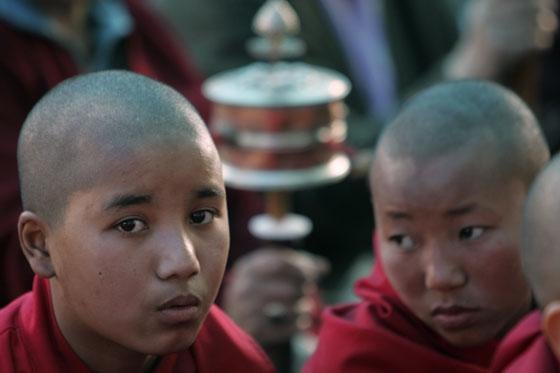
The only Western journalist in Tibet’s capital Lhasa, James Miles, had been applying to enter the capital for ‘years’and was only given permission to enter during the protests by pure coincidence.
Miles, who writes for The Economist, had a standing request to visit Tibet which was finally approved in January.
As a result, Miles was able to give an eye-witness account of the clashes between protesters and the Chinese military which were published in The Times yesterday.
The Economist’s Asia editor Simon Long said: ‘It’s extraordinary that the Chinese authorities agreed to his application knowing it was the anniversary of the ’59 uprising. I hope they realise it’s been to China’s advantage to have James reporting, as it shows there is not a total media blackout, and all of his reports have been meticulously objective.
Long said Miles was detained for an hour-and-a-half by police on Monday.
On Tuesday, he and all the foreign reporters were detained in two hotels before his permit expired on Wednesday.
‘The main problem has been a lack of food – in the hotel they were down to rice,’said Long.
Up to 30 journalists have been turned back from trying to report from Lhasa, according to the Press Freedom Committee of the Foreign Correspondents Club.
East Asia correspondent for The Guardian Jonathan Watts made a seven-hour journey through the Himalayas Qinghai Plateau only to be ordered to return to the airport.
‘As soon as we got over the path and into the nearest town there was only one road through. It had a toll booth and about 10 police were stopping every car and asking for the IDs of all the people,’he said.
Watts said an increase in the number of check points in Tibet and in neighbouring provinces meant that news organisations reporting from the area, including Sky News, The Telegraph and ITN, had all experienced difficulties with their reporting activities.
‘Another difficulty is the size of the place and the huge spread of where these incidents are happening,’Watts added. ‘So we are driving for six or seven or 10 hours, a marathon journey, only to get turned away and have to go back again. I have to confess that I haven’t seen any conflict.”
Guardian editor Alan Rusbridger has sent a letter to Fu Ying, the Chinese ambassador to the UK, urging an end to the media blackout.
Email pged@pressgazette.co.uk to point out mistakes, provide story tips or send in a letter for publication on our "Letters Page" blog

